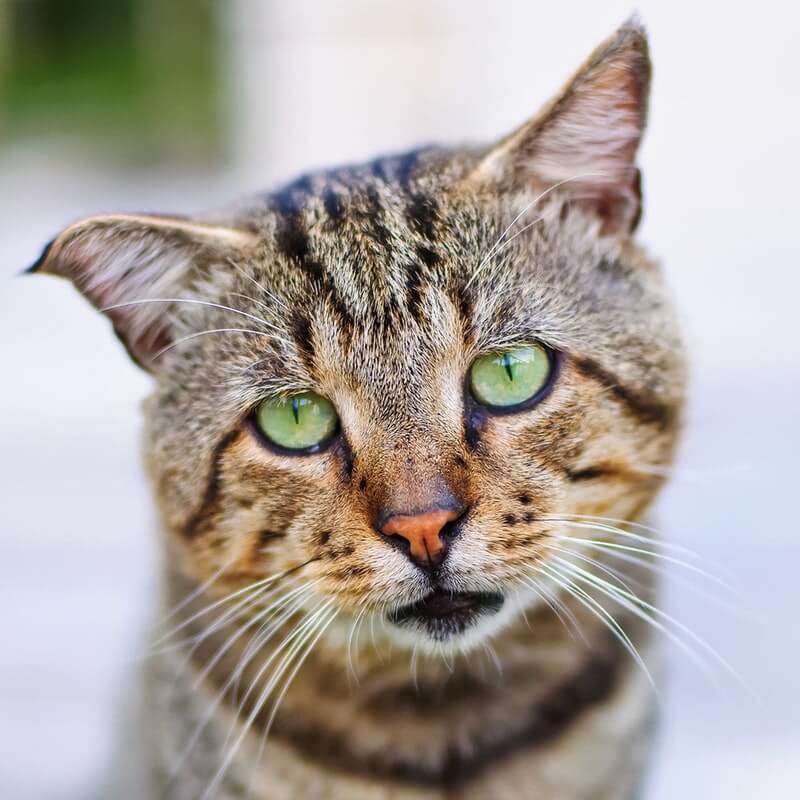
Pets have become a dearly loved part of our families, very much like children. Consequently, ice-cold fear can grip our hearts when medical problems threaten their lives.
Of all the many symptoms that can occur, some are especially alarming such as the jerking movements and weird vocalizations of a seizure.
The veterinarian community classifies such symptoms under the heading of epilepsy if they continue to occur periodically. If a cat has isolated seizures for no apparent reason, they call this idiopathic epilepsy. What if my cat has seizures and what causes cat seizures?
Table of Contents
Symptoms of a Seizure
Cats that are about to suffer from a seizure may experience a sudden shift in behavior. They may seem to be dazed or appear to be frightened and may hide. A Veterinarian might call this an aura, borrowing the term from human medicine.
When the seizure begins, your cat will experience uncontrolled muscular and bodily activities. Some of these include urination and defecation, chomping and salivation, odd vocalizations, and paddling the air with its legs and arms. Other movements can occur with the common denominator that your cat lacks control over them.
Seizures can occur while your cat is sleeping or resting at night or in the morning and generally last between 30 seconds to a couple of minutes. They can also occur during stressful times and in other high-emotion situations as well.
After a seizure, your cat may be confused and disoriented. In more severe cases, the cat can exhibit more extensive behavioral effects such as compulsive behaviors, thirst, pacing, intense appetite, and aimless wandering. Your pet may even experience temporary blindness or other deeper neurological problems that weren’t present before the seizure.
These immediate after-effects of a seizure will often disappear by the time you reach your veterinarian’s office. Recovery can occur within seconds after the seizure stops, or it may require as much as 24 hours (assuming that there are no further seizures).
Causes of Seizures
Even with the current level of medical knowledge today, we do not know the origin of some idiopathic seizures. Genetic studies have hinted that a type of gene may be responsible, but this isn’t proven.
The mammalian brain functions with a balance of chemicals that stimulate brain activity and chemicals that suppress brain activity. It is the lack of suppressing chemicals that seems to be what causes seizures in cats.
Things that reduce or destroy seizure suppressing chemicals can be broken down into diseases or injuries directly in the brain, and problems involving other parts of the body that indirectly affect the balance of these chemicals.
Neurological Causes (brain diseases or injuries)
Injury to brain tissue from fighting, or from the impact of falling, can result in recurring seizures if the areas of the brain that suppress seizure activity are damaged. Collisions with passing automobiles can also lead to brain injury if the cat survives the encounter.
Congenital (born with) abnormalities of the brain can result in the inadequate function of the structures in the brain that suppress seizure activity.
Genetic abnormalities (family abnormalities) can affect not only recurring seizure activity. They can affect idiopathic seizures as well. The presence of seizures caused by this will show complex inheritance tendencies.
Metabolic Causes (diseases of other organs)
Many diseases, if severe enough, can rob the brain of the chemicals that the body uses to suppress seizure activity. Vitamin deficiencies can also reduce seizure-suppressing brain chemicals.
Treatment Of Cats With Seizures
Treatment starts with an accurate and thorough diagnosis. This is necessary to ensure that your cat receives the most effective medication or surgery to correct the problem.
Blood tests are employed to measure blood chemistry, blood cell count, thyroid enzymes, and hormone levels. Veterinarians screen their seizure patients for various viruses like feline AIDS and feline leukemia. They will usually check kidney function as well with a urinalysis.
It is possible to clarify neurological brain function by taking spinal fluid samples and analyzing the chemicals present. Blood as well as spinal fluid, or urine abnormalities can all help explain why seizures are happening.
The veterinarian should also check for signs of open or healed injuries to the head or other parts of the body. These injuries might yield clues to a history of injury affecting brain structure or chemistry.
If these methods yield no clues, your veterinarian may want to turn to diagnostic imaging techniques to improve the diagnosis. All of the same techniques available to humans can be helpful for cats as well.
Surgical Intervention And Medical Therapy
Surgical correction of some injuries will work to stop seizures. Also, treatment at home with anticonvulsant medications will control seizures in the vast majority of cases.
However, remember certain medications used to stop seizures or to improve kidney functions can cause serious side effects. Your veterinarian will likely recommend periodic blood tests to monitor the blood chemistry of your cat.
The need to maintain even blood levels of anticonvulsant medication imposes a constraint on your cats’ freedom. Outdoor activity presents the risk that your cat won’t return when it is time to take the required medication. Therefore, it may be best to curtail those activities for the sake of health.
Some Precautionary Measures That May Help Tame Feline Seizures
Try to correct any possible vitamin deficiencies. To do this, choose higher quality foods and ask your veterinarian if he recommends supplements. If he does, add them to your cat’s treatment plan.
Be sure to spay or neuter cats with proven genetic abnormalities. This is because this prevents the abnormal genes from passing on to new individuals.
Avoid the temptation to give your cat prescription or over the counter human medications. They could be damaging or quite possibly fatal to your pet.
If you need to cut down your pets medication costs, ask your veterinarian if there are any natural alternatives to the treatments he prescribed your pet. Some inexpensive natural product vendors claim very effective results against seizures in cats.
Dietary changes can make a big difference by improving the overall health of your pet. There is quite a bit of information available on this, and your veterinarian can undoubtedly point you to it.
Feline Seizures Is No Death Sentence
In spite of the terrifying sight of your cat in the throes of a seizure, there are ways to determine what is causing it. Even better, there are clear and effective treatments that can reduce the likelihood of it happening again.
Although some seizures can be a sign of severe disease, your cat may be able to live with those caused by typical epileptic conditions for quite some time if treated correctly.
You May Also Interested In:
Share this:
- Click to share on Twitter (Opens in new window)
- Click to share on Facebook (Opens in new window)
- Click to share on Tumblr (Opens in new window)
- Click to share on Pinterest (Opens in new window)
- Click to share on Reddit (Opens in new window)
- Click to share on Telegram (Opens in new window)
- Click to share on WhatsApp (Opens in new window)
- Click to print (Opens in new window)
